#and everyone knows how much parents with strong personalities ~loooooooove~ when their kids. get it from them.
Explore tagged Tumblr posts
Text
carlo's inherent tragedy as a character means that if he hadn't died young he would've gone through something worse. the horrifying realization that he inherited his father's personality <3
#lies of p#geppetto is over and over mentioned and shown to be a very stubborn man.#and the little we see of carlo.... it works.... he was in fact kind of a bull-headed little brat.#and everyone knows how much parents with strong personalities ~loooooooove~ when their kids. get it from them.#i'm not ragging on carlo. the basis of personality that is inherited is not the sole defining factor in what a person is like--#--and what is developed & changed by one's experiences would make them very different people still.#THAT SAID: i do think carlo achieving his little dream of being The Best Stalker In The World WOULD put him at risk of.#going down the same path his dear old man did :^)#there's something about being at the top of your field and what being the unquestioned authority in all that pertains to it can--#--very easily make one close-minded and set in their ways. it's probably what happened with geppetto.#i mean if my timeline is right he fucked with venigni's grand covenant long before he needed to enact mass murder to resurrect his son.#which to me speaks of him considering only himself as a trustworthy authority for a long time.#the tags in these posts really are the main feature now huh. sorry about that i just like talking here better.👍its like a secret post.#anyway. LOVE YOU DEAD BOY
91 notes
·
View notes
Text
Guardian Meta: Love Song Edition
Can we talk about how the Guardian end credits song and the promo song are essentially love songs?
Disclaimer: In the great tradition of Western writers who think their opinion about things they have limited direct knowledge of matters, I’m about to screech about traditional Chinese views of love even though I am not from China nor do I know anyone who has lived in China past the age of 6. Everything I know about the matter comes from my Taiwan-born mother, whose relationship advice could be summed up as “never depend on a man.” You can guess what her love life has been like.
I’ve been listening to “Time Flight” and “Just Cared Too Much,” the promo song and end credits song from the Guardian drama respectively, on repeat lately and I just can’t get over how achingly romantic these two songs are. The opening theme song, “We Won’t Be Falling,” captures the can-do spirit of the SID team and the socialist brotherhood/power alliance between Zhao Yunlan and Shen Wei that everyone associated with Guardian insists the show is really about, but the closing theme song and promo song will forever be the true songs for Shen Wei and Zhao Yunlan to me and no one can convince me otherwise.
Just. look. at. these. fucking. lyrics:

*incoherent screeching*
It also doesn’t help that the official music video for “Time Flight/Flying Across Time” is nearly indistinguishable from the thousands of Weilan fanvids out there.
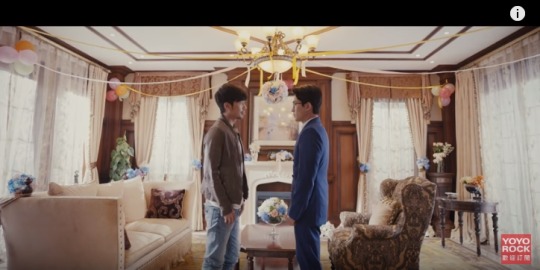
I mean, the first shot of Zhao Yunlan and Shen Wei has them framed with wedding decorations. The video editors were...not subtle.
In an attempt to organize my thoughts around this topic, I’m going to take a step back and look at how the song lyrics reflect a traditional Chinese approach to love and why it’s impossible to interpret the songs as anything other than love songs (unless you’re a Chinese censor, in which case, yes, these songs are totally about platonic friendship).
Stereotypical Eastern vs Western Approaches to Love
Let’s face it, the stereotypical Chinese approach to love is practical nearly to the point of being mercenary. The first question any parent asks when presented with an offspring’s potential suitor is, “What’s his job? What are his prospects? What do his parents do?” In other words, who gives a fuck about things like personality or compatibility or feelings. Romance doesn’t put food on the table.
The concept of falling in love with someone and choosing your own partner is relatively new in Chinese culture and maybe imported from the West (someone back me up/correct me here, I’m too lazy to Google this). According to family lore, my great grandmother and her generation (born 1890s Fujian province, married 1910s) followed traditional practices around dowry and matchmaking, where essentially your parents pick your partner based on family relationships and social standing within the community. You get limited say in the matter.
Western ideals around love, attraction, passion, compatibility, personality, courtship, and romance were traditionally not factors in a relationship, at least in the beginning. Instead, traditional Chinese ideals value steadfastness, stability, loyalty, partnership, duty, responsibility, and a love that grows over time. Whereas Western depictions of love in modern media often focus on explosive passion, magnetic attraction, wild declarations, daring courage, individual charisma, finding that spark, and, in more modern relationships, choosing someone who fulfills your personal/emotional needs or as an avenue for self-actualization, love in traditional Chinese culture is steady, humble, something that grows out of mutual striving, something that takes root deeply and quietly through the day to day, like two trees slowly growing together until they are entwined.
In the Guardian web novel, Zhao Yunlan’s father expresses the traditional view of love during his discussion with Zhao Yunlan about his relationship with Shen Wei:
“Perhaps one day, when your hormonal levels are back to normal, you will regret this decision.” Zhao’s father maintains a calm and stately tone, relaxing and not at all intimidating. It’s much easier to persuade someone this way; he says, “Passion is attractive; I’ve been young. I know that feeling. But I don’t agree with difficult love, do you know why?”
[…]
“Love is strong yet frail; perhaps in the face of adversity, it can rise up with great power, transcending into a sort of exemplary ardour, and that is why it’s been praised since ancient times. But you have to remember the saying: ‘It isn’t the mountain ahead that wears you out; it is the grain of sand in your shoe’.”
[…]
“Difficult love can be overcome with perseverance and grit. But love has to subside eventually, have you thought of that?”
—excerpt from chapter 74, RainbowSe7en translation
Again, modern Chinese relationships are very different, where the feelings of the two people involved often do outweigh the views of the family, and relationships are viewed more as individual choices made for personal reasons rather than collective decisions made for the well-being of the whole family. As Zhao Yunlan expresses, the modern view of love is intimate and personal:
“Dad, I know what you mean, but there is always someone in your life, it’s not because of attraction, allure, obsession, or mere lust; it’s if you don’t treat this person right, then you’d feel like a worthless prick.”
—excerpt from chapter 74, RainbowSe7en translation
But my point is that love in Chinese tradition stems from a different perspective. It’s a perspective that views feelings as fleeting, romance as a luxury. It values durability over passion. True love is something that can withstand separation, hardship, and the long march of time. It is built on a foundation of duty to one another, responsibility, patience, loyalty, sacrifice, and a depth of feeling that does not necessarily need to be showy or even stated aloud, but that can be felt intensely in one’s heart and seen in one’s actions.
Themes in Guardian Theme Songs
Given this perspective on love, it’s a no-brainer that Guardian’s theme songs are love songs, but let’s dive into the lyrics anyways.
Note: all lyric translations are based on the Orange Biscuit Subs translation.
Separation
Chinese folktales and mythology is littered with stories of tragic love and separation. It seems like the more tragic the love story, the more popular it is, and parents loooooooove to tell these tales to their kids. (WTF, China? No wonder Chinese dramas are so overdramatic.) One story that my family liked to tell for the Mid-Autumn Festival is the story of Hou Yi and Chang’e. We would stand outside in the backyard and look up at the harvest moon, and my mother would tell us the tale of how Chang’e sacrificed herself by swallowing the pill of immortality and floated up to the moon, where she lives forever alone, yearning for her husband Hou Yi on earth.
Another very well-known tale is the story of the cowherd and the weaver girl. Per Wikipedia:
The tale of the cowherd and the weaver girl is a love story between Zhinü (織女; the weaver girl, symbolizing the star Vega) and Niulang (牛郎; the cowherd, symbolizing the star Altair).[3] Their love was not allowed, thus they were banished to opposite sides of the Silver River (symbolizing the Milky Way).[3][4] Once a year, on the 7th day of the 7th lunar month, a flock of magpies would form a bridge to reunite the lovers for one day.[3]
Yep, separated lovers get to be together for one whole day of the year. This is peak Chinese RomanceTM.
Given this cultural context, the ending of Guardian, with its brief reunion and the promise between Shen Wei and Zhao Yunlan to meet again in another life, is considered not only tragic, but could potentially be read as extremely romantic:

Their mutual pact to one day meet again echoes the themes of separation and reunion that form the backbone of so many Chinese love stories:
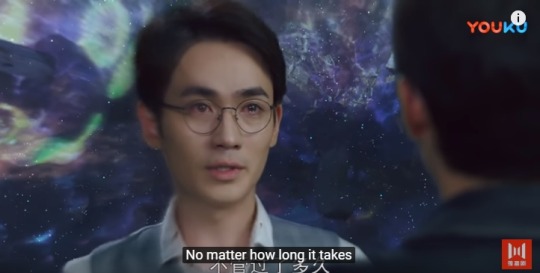


Then there’s the fact that “Time Flight” is playing in the background of this whole scene, which very unsubtly shows that the song is specifically written about the drama ending and about Shen Wei and Zhao Yunlan. I mean, there’s dialogue in the scene that matches the lyrics for chrissakes:


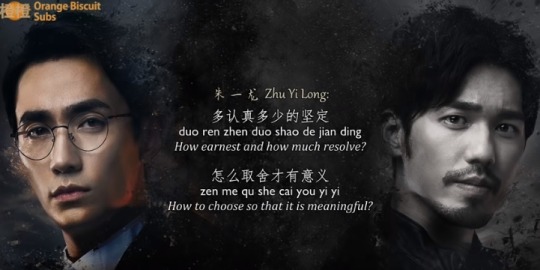
Steadfastness, stability, loyalty, resoluteness

Related to the theme of separation, another favorite trope of Chinese romance is the steadfast lover who awaits news of her beloved (it’s usually the woman who does the waiting while the man rides off to war or whatnot) without losing hope. The chorus from “Time Flight” includes this concept of waiting for news while keeping the faith, but what’s really interesting to me is how things shift from the first chorus to the third.
In the first chorus (above), it’s Bai Yu singing the lines. In the second chorus, Bai Yu and Zhu Yilong share them. In the third closing chorus, they share the chorus again, but the lyrics change slightly:
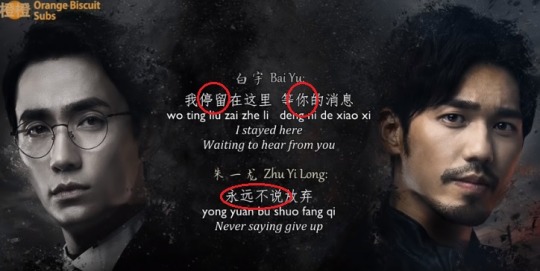
We know that repetition and variation are significant in poetry and lyrics, so we need to pay attention to how this change affects the meaning of the song. I’d quibble with the translation just a bit, because there’s a difference between “deng yi ge xiao xi” vs “deng ni de xiao xi.” The former uses “yi ge,” which is generalized, i.e. “I’ve been here waiting for news.” The “from you” is implied but not stated explicitly. But in the third chorus, the lyrics change to “ni de,” which is explicit, i.e. “I’m waiting for your news.” It’s a lovely shift that makes a common romantic trope even more specific and personal.
The final line is also a shift, taking the last line of the chorus and changing it from “flying together” (yi qi = together / fei xing = flying) to “I remain in the same place.”

Those last few words deserve some unpacking, since video subtitles can’t fully capture all the context and implied meanings of such a dense language as Chinese. “Yuan di” is not just “same place,” but also “original place,” or “where I’ve been all along.” There are multiple ways to read this, from “Across time, I have remained in this spot unmoving, waiting for you,” which speaks to those themes of loyalty, hope, and steadfastness. Or “Across time, I have not gone anywhere, so you can always find me here,” which speaks to themes of hope for your loved one’s return and optimism about reuniting.
However you want to read that last line, you can’t ignore how it plays into the romantic trope of keeping the faith for your beloved and awaiting their return.
Words Unsaid

I didn’t notice until I started writing this giant brain dump of an essay that the first word here is “zao,” meaning “early.” So that chorus line could be interpreted as “Knowing from the start that we would be separated.” I just….can’t with these lyrics.
Anyways, we know that what’s left unsaid is often more powerful than what’s been said aloud, and you can see it in these lyrics here. Zhao Yunlan and Shen Wei never say “I love you,” but it’s implied in all of their actions and looks, and it’s one of the primary plot drivers of the ending of the Guardian drama. As @riceworkshop discussed in this fascinating meta on Dreamwidth, it’s the selfishness of that love and Shen Wei’s choice to essentially use his life force to heal Zhao Yunlan’s eyes—putting the individual before the whole, his feelings and needs before duty—that cripples him and leaves him an unequal match to Ye Zun. But their love remains unspoken, largely due to Chinese censorship but also partially due to the whole “two people from different worlds/this can only end in tragedy” thing.
In the novel, Shen Wei knows explicitly from the beginning that anything between them can’t last and will only lead to ruin. In the drama the situation is different, but he no doubt senses that their time is limited, given the clues about Ye Zun’s coming and the fact that he already lost Kunlun/Zhao Yunlan once. When it comes down to it, “Just Cared Too Much” is literally the crux of Shen Wei’s problem.
(It’s Zhao Yunlan’s problem too, because if he weren’t so in love with Shen Wei, then he wouldn’t have gone back in time and looked at young Shen Wei like this:
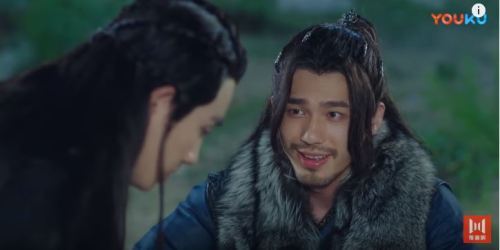
And like this:
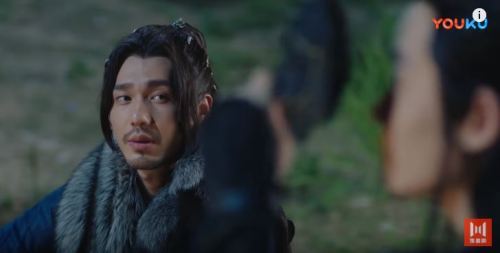
And said things like this:

Which caused young Shen Wei to fall madly in love with him.)
In Conclusion
In conclusion, China loves tragic romance and keeping soulmates apart for shits and giggles, Guardian’s theme songs are love songs, and I have spent way too much time thinking about Zhao Yunlan and Shen Wei’s stupid faces.
#guardian meta#guardian tv#lyric analysis#ow my heart#weilan#shen wei#zhao yunlan#this is why I keep crying over Guardian
184 notes
·
View notes